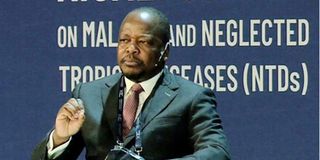Kagwe touts Kenya’s use of data, surveillance to fight malaria

Speaking at a summit on malaria and neglected tropical diseases (NTDs) in Kigali, Rwanda, Mr Kagwe said appropriate tools and technologies need to be developed to deal efficiently with prevailing health challenges.
Health Cabinet Secretary Mutahi Kagwe has called for more investment in research and innovation to better deal with current and emerging health concerns.
Speaking at a summit on malaria and neglected tropical diseases (NTDs) in Kigali, Rwanda, Mr Kagwe said appropriate tools and technologies need to be developed to deal efficiently with prevailing health challenges.
“Innovation is needed both in developing new tools and technologies and in ensuring these vital tools reach those communities who need them – where and when they are needed most”, Mr Kagwe said.
In recent years, Commonwealth countries have committed to reducing the burden of malaria and other largely preventable and treatable diseases.
In 2018, leaders pledged to cut by half malaria cases across the Commonwealth by 2023, eliminate blinding trachoma by 2020, and combat other mosquito-borne diseases.
Anti-malaria efforts have yielded impressive results, with an estimated 10.6 million malaria deaths and 1.7 billion cases averted between 2000 and 2020.
Some 26 countries reported fewer than 100 indigenous malaria cases in 2020, up from just six countries in 2000.
Nine countries have been certified as malaria-free since 2015, says the World Health Organization (WHO).
Mr Kagwe noted that Kenya has adopted innovative strategies to help improve access, including a focus on better data and surveillance and the use of drone technology for larval mosquito control.
There is also the Malaria Youth Army, an innovative platform that brings together young people from all 47 counties to fight malaria, as well as plans to launch the use of paediatric praziquantel to prevent and treat vulnerable children for schistosomiasis.
Regional and international players, he said, need to focus on partnerships on local research and development and manufacturing of public health tools and commodities.
Ensure stability
Local quality manufacturing will also help ensure stability and affordability of commodities.
“Now more than ever, we need to work together to eradicate malaria and NTDs, to free the capacity of our health workers to address health conditions that cannot be avoided, and strengthen the resilience of our health system,” he said.
“We have an opportunity to put an end to the many deaths occasioned, allow our people to become more productive, and ensure the growth of our countries’ economies.”
WHO has noted substantial progress in the fight against NTDs.
It says 46 countries have eliminated at least one NTD, and that between 2015 and 2019, more than one billion people were treated yearly for one or more NTDs.
From 2010 to 2020, the number of people requiring an NTD intervention was reduced by 600 million. Cases of African trypanosomiasis have also fallen by 90 percent over the last 10 years. Only 15 cases of Guinea worm disease were reported in 2021 globally, compared with 3.5 million in the mid-1980s.
Trypanosomiasis or trypanosomosis is the name of several diseases in vertebrates caused by parasitic protozoan trypanosomes of the genus Trypanosoma.
During the summit, Melinda French Gates, co-chair of the Bill & Melinda Gates Foundation, announced a $140 million commitment over four years for new initiatives and research directed by African institutions and leaders that accelerate efforts to end malaria and NTDs and contribute to the continent’s Covid-19 recovery.
During the Covid-19 pandemic, most malaria-endemic countries experienced moderate disruptions to malaria services, and some countries saw delays in the delivery of insecticide-treated net campaigns.
In the first year of the pandemic, disruptions to malaria services contributed to a marked increase in malaria cases (14 million) and to at least two-thirds of the additional 69,000 deaths recorded in 2020 compared with 2019.
NTD programmes, especially community-based interventions such as preventive chemotherapy campaigns, were among the most severe and frequently affected across the spectrum of health services.
The number of people receiving treatment for a neglected tropical disease fell by one-third in 2020 due to health service disruptions caused by the pandemic.





